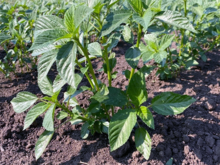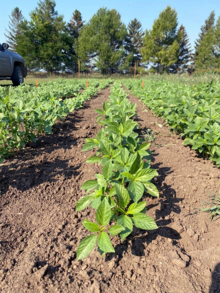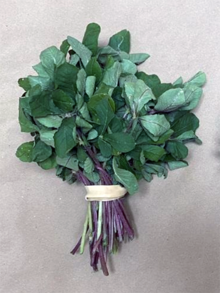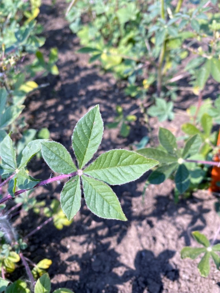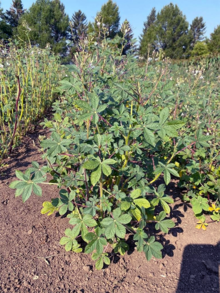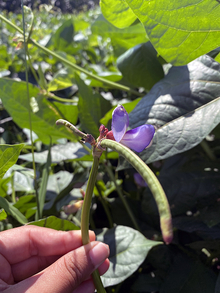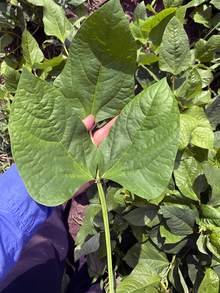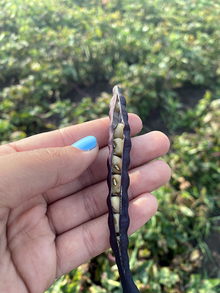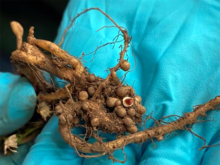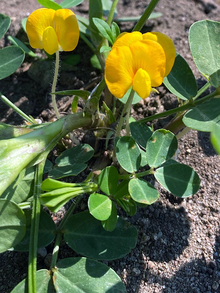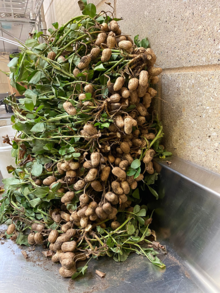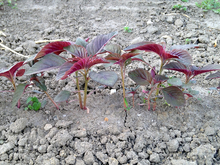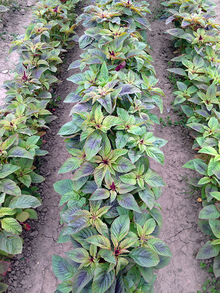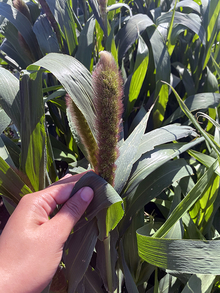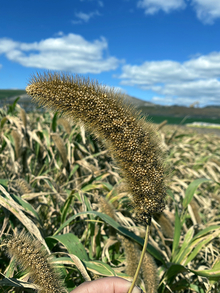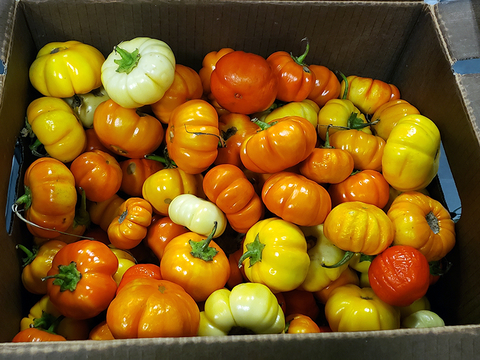This page features basic growing guides for staple vegetables from around the world that are grown by immigrant farmers and gardeners in Minnesota. Traditional crops may perform differently in Minnesota where the growing season is short, summer day lengths are long, and new insects and diseases may be present.
Growing guides
For each crop, we provide basic growing information, an overview of nutrient and water needs, and common insects and diseases that these crops may be vulnerable to in the Upper Midwest.
Molokhia is a leafy green vegetable with a slimy texture that is often used in stews. It is grown and eaten in the Middle East, North Africa, Sub-Saharan Africa, parts of Southeast Asia, and the Caribbean.
This plant is also known by the names molokia, jute mallow, jews mallow, and omotere.
Planting tips for growing molokhia in Minnesota
- Germination: Wait until the soil is 65° F to plant outdoors. Molokhia can be direct seeded or transplanted, but small seeds make consistent germination difficult outdoors.
- Planting depth: Very shallow; seeds should be barely covered with soil.
- Row spacing: 30-36 inches.
- Within-row plant spacing: 2-3 inches for bunched greens, 6-12 inches for continual harvest.
- Days to harvest: 40-60 days for bunched greens. For continuous leaf harvest, start harvesting individually at 40 days and continue throughout the summer. Plants will become bush-like.
We do not recommend heat treating molokhia seeds because it can reduce germination.
Soil and nutrients
- The ideal soil pH for molokai is 6.0-7.0.
- Molokhia has average nitrogen requirements, with 50-90 pounds of nitrogen needed per acre (50 in high organic matter soils, 90 in low organic matter soils).
- Use less fertilizer if you have applied compost or manure recently, and test the soil for phosphorus and potassium recommendations.
Water
Molokhia is tolerant to drought. It should be watered well at the time of seeding or transplanting, but it tolerates drought once it is established.
Pests
Molokhia is vulnerable to aphids and leaf-eating beetles including Japanese beetles. If grown in a greenhouse, molokhia can be vulnerable to spider mites.
Chinsaga is a leafy green vegetable with a bitter flavor that is commonly eaten in Kenya.
This plant is also known by the names five finger plant, spider wisp and spider plant.
Planting tips for growing chinsaga in Minnesota
- Germination: Wait until the soil is 65° F to plant outdoors. Chinsaga can be direct seeded or transplanted, but small seeds make consistent germination difficult outdoors.
- Planting depth: Very shallow; seeds should be barely covered with soil.
- Row spacing: 12-36 inches.
- Within-row plant spacing: 2-3 inches for bunched greens, 6-12 inches for continual harvest
- Days to harvest: 30-40 days for bunched greens. For continuous leaf harvest, start harvesting individual leaves at 20 days and continue until flowering. Leaves become bitter once the plant flowers.
Chinsaga readily reseeds itself and is known as a weed in some places. Remove plants when they begin to flower to avoid reseeding.
Soil and nutrients
- The ideal soil pH for chinsaga is 6.0-7.0.
- Molokhia has average nitrogen requirements, with 50-90 pounds of nitrogen needed per acre (50 in high organic matter soils, 90 in low organic matter soils).
- Use less fertilizer if you have applied compost or manure recently, and test the soil for phosphorus and potassium recommendations.
Water
Chinsaga is tolerant to drought. It should be watered well at the time of seeding or transplanting, but it tolerates drought once it is established.
Pests
- Chinsaga has very few insect pests, but it is occasionally vulnerable to aphids.
- Weeds can be challenging due to slow germination.
Cowpeas are eaten for their leaves, fresh pods and dried seeds.
This plant is also known by the names egesare and kunde.
Planting tips for growing cowpeas in Minnesota
- Germination: Wait until the soil is 65° F to plant outdoors. Cowpeas should be direct seeded at a rate of 50 pounds per acre.
- Planting depth: 1/2 inch
- Row spacing: 20-30 inches
- Within-row plant spacing: 1.5 inches
- Days to harvest: 40-59 days for leaves, 60-80 days for pods, and 110-120 days for mature seeds.
Cowpeas are often companion planted with corn. Some local varieties are bred to be cover crops; these produce more leaves and fewer seeds than other cowpeas.
Soil and nutrients
The ideal soil pH for cowpea is 5.5-6.5. Cowpea fixes its own nitrogen, so no nitrogen fertilizer is needed. Inoculate seed with rhizobia bacteria for best results. Test soil for phosphorus and potassium recommendations.
Water
Cowpea is tolerant to drought. It should be watered well at the time of seeding, but it tolerates drought once it is established.
Pests
Cowpea is vulnerable to potato leafhopper, leaf-eating beetles, mites and aphids.
Peanuts are grown around the world. Due to the short growing season in Minnesota, they are often harvested unripe and boiled. Some shorter season varieties can be grown to maturity for drying.
Planting tips for growing peanuts in Minnesota
- Germination: Wait until the soil is 65° F to plant outdoors. Cowpeas should be direct seeded at a rate of 75-100 pounds per acre.
- Planting depth: 1-1.5 inches
- Row spacing: 24-36 inches
- Within-row plant spacing: 2.5-3 inches
- Days to harvest: 90-110 days for fresh peanuts for boiling, 110-120 days for fully mature peanuts.
Many peanut varieties will not produce in Minnesota's short growing season. Use a variety that matures in less than 120 days. Peanuts grow best in sandy soils. Harvest is time consuming and difficult in heavier soils.
Soil and nutrients
- The ideal soil pH for peanuts is 6.0-6.5.
- Peanuts fix their own nitrogen, so no nitrogen fertilizer is needed.
- Inoculate seed with rhizobia bacteria for best results.
- Test soil for phosphorus and potassium recommendations.
Water
Peanuts are moderately drought tolerant. They can handle some drought, but water them regularly for good yields.
Pests
Peanuts are vulnerable to birds, mice, and gophers, especially right after sowing.
Plants are vulnerable to potato leafhopper, leaf-eating beetles, mites and aphids.
This plant is also known by the names African nightshade and Common African nightshade. It is in the same family as tomatoes, peppers and eggplants, but is eaten as a leafy green vegetable. It has a bitter flavor and is typically boiled before eating. This plant can be toxic if it is not cooked properly.
Planting tips for growing managu in Minnesota
- Germination: Wait until the soil is 60° F to plant outdoors. Managu can be direct seeded or transplanted.
- Planting depth: Very shallow; seeds should be barely covered with soil.
- Row spacing: 24-36 inches.
- Within-row plant spacing: 12-18 inches.
- Days to harvest: Start harvesting leaves at 40 days until the end of summer. Leaves must be cooked prior to eating. Avoid letting plants set fruit if possible due to this plant's tendency to spread.
This plant is closely related to toxic nightshades. Only use seed from trusted sources and do not collect wild seed. It also has a weedy habit and a tendency to outcompete other plants. Avoid flowering and fruit set if possible.
Soil and nutrients
- The ideal soil pH for managu is 6.0-7.0.
- Managu has average nitrogen requirements, with 50-90 pounds of nitrogen needed per acre (50 in high organic matter soils, 90 in low organic matter soils).
- Use less fertilizer if you have applied compost or manure recently, and test the soil for phosphorus and potassium recommendations.
Water
Managu is tolerant to drought. It should be watered well at the time of seeding or transplanting, but it tolerates drought once it is established.
Pests
Managu is vulnerable to flea beetles, Colorado potato beetle, three lined potato beetle and bean leaf beetle.
This plant is also known by the names mchicha, emboga and quintoniles. Amaranth is consumed around the world, often in dry climates, for both leaves and seeds.
Planting tips for growing amaranth in Minnesota
- Germination: Wait until the soil is 60° F to plant outdoors. Amaranth can be direct seeded or transplanted.
- Planting depth: Very shallow; seeds should be barely covered with soil.
- Row spacing: 12-24 inches.
- Within-row plant spacing: 8-12 inches.
- Days to harvest: Leaves can be continually harvested when the plant reaches approximately 8 inches tall. For bunched greens, wait 40-60 days. Seeds mature around 90-100 days.
There are many species of amaranth. A. tricolor and A. dubius are usually used for leaves. A. cruentus is usually used for leaves and seeds. Amaranth has a weedy habit and a tendency to outcompete other plants. Avoid flowering and seed set if possible.
Soil and nutrients
- The ideal soil pH for amaranth is 6.0-7.0.
- Amaranth has average nitrogen requirements, with 50-90 pounds of nitrogen needed per acre (50 in high organic matter soils, 90 in low organic matter soils).
- Use less fertilizer if you have applied compost or manure recently, and test the soil for phosphorus and potassium recommendations.
Water
Amaranth is tolerant to drought. It should be watered well at the time of seeding or transplanting, but it tolerates drought once it is established.
Pests
Amaranth is vulnerable to flea beetles.
While corn is a common crop in Minnesota, many growers from around the world are interested in growing varieties from their home countries. This includes sweet and dent varieties.
Planting tips for growing corn in Minnesota:
- Germination: Wait until the soil is 50-55° F to plant outdoors for field corn, and 65-70° F for sweet corn. Corn is usually direct seeded, but sweet corn can be transplanted for earlier harvesting.
- Planting depth: 1.5-2 inches
- Row spacing: 30-36 inches
- Within-row plant spacing: 8-12 inches
- Days to harvest: 60-100 days. Begin harvesting when silks start to brown, 18-24 days after they first appear for sweet corn, or 45-60 days after silks appear for flint and dent corn.
Grow corn at least 1/2 mile away from other varieties of corn if you intend to save the seed, and use open pollinated varieties. Many tropical corn varieties will not form ears in Minnesota due to the short growing season and differences in day length.
Soil and nutrients
- The ideal soil pH for corn is 5.8-7.0.
- Corn has high nitrogen requirements, with 120-190 pounds of nitrogen needed per acre (120 in high organic matter soils, 190 in low organic matter soils).
- Use less fertilizer if you have applied compost or manure recently, and test the soil for phosphorus and potassium recommendations.
Water
Corn needs approximately one inch of water per week. Consistent water is especially important once corn begins to tassel. Some heirloom varieties have better drought tolerance.
Pests
Corn is vulnerable to corn earworm, European corn borer and corn smut.
Additional names for pumpkins and squash include risosa and calabaza. While pumpkins and squash are common crops in Minnesota, many immigrant growers harvest the leaves from these crops to cook as leafy green vegetables.
Planting tips for growing squash in Minnesota
- Germination: Pumpkins and squash can be direct seeded in Minnesota in early June. If you are transplanting, wait until the soil temperature reaches 60° F.
- Planting depth: 1 inch.
- Row spacing: 5-6 feet.
- Within-row plant spacing: 24-36 inches.
- Days to harvest: Begin harvesting leaves around 35-60 days. Leave the newest two leaves on the vine to encourage more growth if you hope to also harvest flowers or fruit. Flowers can be harvested starting around 60 days. Only harvest male flowers if you hope to also get fruit. Fruit become ripe around 90-120 days.
Squash and pumpkin varieties can readily cross pollinate. Only plant one variety, or maintain at least 800 feet between varieties if you plan to save seed.
Soil and nutrients
- The ideal soil pH for squash is 6.0-6.8.
- Squash has relatively low nitrogen requirements, with 30-70 pounds of nitrogen needed per acre (30 in high organic matter soils, 70 in low organic matter soils).
- Use less fertilizer if you have applied compost or manure recently, and test the soil for phosphorus and potassium recommendations.
Water
Squash needs approximately one inch of water per week. Consistent water is especially during flowering and fruit set.
Pests
Squash is vulnerable to squash bugs, squash vine borer, cucumber beetle and powdery mildew. Blue hubbard squash are sometimes used as a trap crop to lure insects away from other varieties.
There are many species of millet. Species that reliably produce seeds in Minnesota include foxtail millet (Setaria italica) and proso millet (Panicum miliaceum L.). Millet seeds can be cooked and eaten in a similar way to quinoa, amaranth or other grains.
Planting tips for growing millet in Minnesota
- Germination: Wait until the soil is 65° F to plant outdoors. Millet can be direct seeded by broadcasting or with a seeder. Seed at 15-20 pounds per acre or 75-100 seeds per square foot.
- Planting depth: 1/2 to 3/4 inch.
- Row spacing: 6-7.5 inches.
- Within-row plant spacing: 2-4 inches.
- Days to harvest: 120 days.
Soil and nutrients
- The ideal soil pH for millet is 6.0-6.8.
- Millet has average nitrogen requirements, with 50-90 pounds of nitrogen needed per acre (50 in high organic matter soils, 90 in low organic matter soils).
- Use less fertilizer if you have applied compost or manure recently, and test the soil for phosphorus and potassium recommendations.
Water
Millet is tolerant to drought. It should be watered well at the time of seeding or transplanting, but it tolerates drought once it is established.
Pests
- Millet does not have any major insect pests, but weed management can be challenging. Planting later in June after weeding multiple times can help to manage early season weeds.
- Birds sometimes eat the seeds as they ripen. Reflective black tapes can help to repel birds during ripening. Harvest as soon as seeds are mature.
This plant is also known by the names bitterball, pea eggplant, Liberian kittley, likok and intore. These eggplants are related to common eggplants grown in Minnesota by growers of European descent, but these types are smaller and more bitter.
Planting tips for growing kittley in Minnesota
- Germination: Wait until the soil is 65° F to plant outdoors. Transplant if possible.
- Planting depth: 1/4 inch.
- Row spacing: 30-60 inches.
- Within-row plant spacing: 12-18 inches.
- Days to harvest: First fruits ripen in 60-70 days and plants will continue to fruit until frost. Harvest fruit when they are green or white and soft. Fruit become bitter as they turn red.
Some varieties have sharp stems. Handle with care, and consider wider spacing with these varieties to avoid being scraped while doing field work.
Soil and nutrients
- The ideal soil pH for kittley is 6.0-7.0.
- Kittley has average nitrogen requirements, with 50-90 pounds of nitrogen needed per acre (50 in high organic matter soils, 90 in low organic matter soils).
- Use less fertilizer if you have applied compost or manure recently, and test the soil for phosphorus and potassium recommendations.
Water
Kittley is moderately drought tolerant. It needs one inch of water per week, especially during flowering and fruit set.
Pests
Kittley is vulnerable to Colorado potato beetle.
Where to find seeds to grow traditional vegetable crops
There are many seed companies and associations that sell seeds of traditional crops from around the world. Do not transport seeds from country to country yourself. This helps to prevent the introduction of seedborne diseases. Instead, purchase seed from an existing company or from people already growing the plants you want to grow in your community.
Latin America: Companies that sell crops traditionally grown in Latin America include Southern Exposure Seeds, Johnnys Selected Seeds, Jordan Seeds (local), Reimer Seeds, and Sandia Seed Company.
Africa and African diaspora: Companies that sell crops traditionally grown across Africa and by African American growers include Carter Brothers Seed, TrueLove Seeds, Southern Exposure Seed, Sistah Seeds, Ujamaa Seeds, and Kitazawa Seeds.
Native American: Seeds traditionally grown by Native American growers can be found through the Alliance of Native Seedkeepers, the Indigenous Seed Initiative, and Native Seeds Search.
Asia and Asian diaspora: Companies that sell crops traditionally grown in Asia and by Asian American growers include Kitazawa Seeds, Second Generation Seeds, and Jordan Seeds.
Local companies: There are some local seed companies (including from the Upper Midwest) that may stock culturally-specific seed. These include Jordan Seeds, North Circle Seeds, the Experimental Farm Network, Seed Savers Exchange, Great Lakes Staple Seed, and Urban Farmer.
- The US Department of Agriculture maintains seed banks with seeds from across the world. Extension educators or UMN plant science faculty may be able to help growers who are looking for specific varieties of seed.
- If you request seed from the USDA genebank for on-farm breeding and trials, you may get a faster response if you work with an Extension educator.
- The UMN Plant Breeding Center may be available to work with farmers on breeding projects and seed access for research purposes.
- If you save seed, only save seeds from the healthiest plants in your garden or farm.
About this guide
Research-based information about nutrient management, pest management, and variety selection allows growers to reduce risk and make informed management decisions. But research-based recommendations in Minnesota are currently tailored to crops that are primarily of interest for people of European descent.
This project emerged from a grant funded by the Minnesota Department of Agriculture to establish nutrient management recommendations for five crops in Minnesota (molokhia, spider wisp, cowpea, peanut and millet). The UMN project team included Paulo Pagliari, Natalie Hoidal, Carl Rosen, Julie Grossman and graduate student Jessica Barbosa Oliveira. Our farmer collaborators included Naima Dhore, Moses Momanyi, Kazoua and Michael Berry, May Lee, and Zongxee Lee.
The information on this page comes primarily from observations from these trials. We also collaborated with the UMN Plant Breeding Center and The Village Agricultural Cooperative. The graduate students at the plant breeding center have been growing a variety of crops from around the world. The growers at The Village have been trialing their traditional crops at their farm in Rochester; they allowed our team to visit to scout for insects and diseases and learn about their practices.
Much of the information included in these guidelines comes from trials conducted at the University of Minnesota in 2021 and 2022, and from observations from grower collaborator’s farms during the same period.
Additional references:
Davis, D.W., Oelke, E.A., Oplinger, E.S., Doll, J.D., Hanson, C.V., Putnam, D.H. 1992. Cowpea. Alternative Field Crops Manual, Wisconsin Cooperative Extension, University of Minnesota Extension, and the Center for Alternative Plant and Animal Products.
Hoidal N, Díaz Gallardo M, Jacobsen S-E and Alandia G (2019) Amaranth as a Dual-Use Crop for Leafy Greens and Seeds: Stable Responses to Leaf Harvest Across Genotypes and Environments. Front. Plant Sci. 10:817.
Jaron, R. 1997. Growing peanuts in the home garden. Iowa State University Extension and Outreach, Horticulture and Home Pest News.
Long, P., Doust, A., Holcomb, R. 2014. Growing North American Indigenous Corn. Oklahoma State University Extension webpage.
MacKenzie, J. 2018. Growing sweet corn in home gardens. University of Minnesota Extension.
Mashamaite, C.V., Manyevere, A., Chakauya. 2022. Cleome gynandra: A wonder climate-smart plant for nutritional security for millions in semi-arid areas. Frontiers in Plant Science. 13. https://doi.org/10.3389/fpls.2022.1003080
Oelke, E.A., Oplinger, Putnam, D.H., Durgan, B.R., E.S., Doll, J.D., Undersander, D.J., Millet. Alternative Field Crops Manual, Wisconsin Cooperative Extension, University of Minnesota Extension, and the Center for Alternative Plant and Animal Products.
Putnam, D.H., Oplinger, E.S., Teynor, T.M., Oakley, E.A., Kelling, K.A., Doll, J.D. 1992. Peanut. Alternative Field Crops Manual, Wisconsin Cooperative Extension, University of Minnesota Extension, and the Center for Alternative Plant and Animal Products.
SARE. 2007. Managing Cover Crops Profitably, 3rd Edition, pages 128-129.
Särkinen, Tiina et al. “A revision of the Old World Black Nightshades.” PhytoKeys, 106 1-223.
Schuh, M., Fritz, V., Rosen, C. 2022. Growing pumpkins and winter squash and pumpkins in home gardens. University of Minnesota Extension.
Seed Savers Exchange. 2022. Seed Saving Chart.
USDA NRCS PLANTS profile: Cleome gynandra L. spiderwisp
For questions about growing these crops or about this project, reach out to the project team:
- Natalie Hoidal: hoida016@umn.edu
- Jessica Oliveira: barbo124@umn.edu
- Paulo Pagliari: pagli005@umn.edu
- Carl Rosen: rosen006@umn.edu
- Julie Grossman: jgross@umn.edu
Reviewed in 2023


